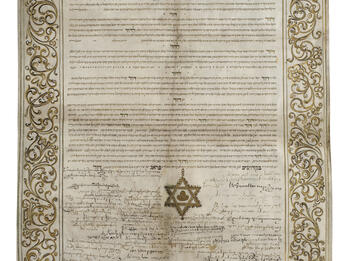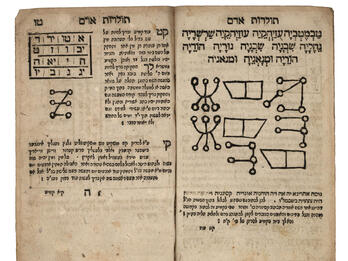Letter to Abraham of Perugia
A Copy of the Letter That Our Honorable Rabbi and Teacher, R. Israel from Jerusalem Sent to Our Honorable Teacher Abraham of Perugia
[ . . . ] Last week, during the days of Hanukkah, we encountered the same Jewish man who had been a captive at sea and was sold from hand to hand, until he was sold in Alexandria in Egypt; and the Jews gave up a large ransom in order to redeem him. He is almost like a Black man. He told us that in his land there are several tens of thousands of Jews. They have a great king who went to war every day with the neighboring Christians. He resides next to the Nile River of Egypt, apart from another king who is in Singalon, which is a forty-day distance from Aden. The latter has Muslims and Christians under his rule; and this is certain, for I have spoken with many people from his city, and all the people of Jerusalem, that they have forty families. Today, I spoke with our respectful leader, may God protect his soul, regarding the matter of the ten tribes. He told me that a certain Jew had stayed at his house, who spoke Cushite, biblical Hebrew, and Hebrew. For he said that in his land, there is no written book of the oral Torah, and that in regard to all decisions, they say, “Thus Joshua said, from the mouth of Moses and from the mouth of God.” He said that in his land there are four tribes: the tribe of Simon, the tribe of Issachar, and two others, whose names he could not remember. The tribe of Issachar busies itself with Torah day and night. Regarding all of the other tribes, some of them busy themselves with Torah while others occupy themselves with war, for they are tribes that dwell next to Christians.
There are many ruined towers on the border, and in each and every tower are gathered the mightiest of the young men of the people of Israel who are available. Any time that anyone approaches during the day, they send out smoke in the towers as a sign, and at night, they make fire, and then all of the people gather in order to fight with them. He said that at times of duress, they ask and are answered from the heavens. The leader of the tribe of Issachar wraps himself in his prayer shawl and goes into a secluded place within the synagogue to pray. And when his prayers are answered, fire immediately descends from the heavens and is seen by all; it descends upon the head of the leader, but the answer is not heard by everyone; it is heard by the leader alone.
Once the Cushites brought a Jew from Portugal and asked him about the people of the diaspora, and about Jerusalem, and about the Temple. He told them that we are in a state of great distress, and that we wander from nation to nation in captivity and in distress, and that the Temple was destroyed, and that Jerusalem was desolated at the hands of strangers. They immediately tore their clothes and wept great tears for many days, and agreed to gather together and to come to Jerusalem in order to fight for it; but the leader told them, “Wait until I ask what shall be told to me from the heavens.” He asked, as was his manner, and was answered from the heavens, “The time of salvation has not yet come; nobody may move from his place; but salvation will come soon.” Then ten rich men sprung forward and volunteered to go from kingdom to kingdom and from people to people, until they would arrive in Jerusalem. They boarded a ship with the African and sailed to the lands that the king of Portugal had conquered. The king of Portugal sent for them, and when they told him of their glorious wealth [Esther 5:11] and their power and strength, and their intention and desire to fight with Prester John [a legendary king] and that they receive answers from heaven, he felt ashamed that he had expelled them, and he did not want it to be heard throughout the kingdom that there was still hope and a remnant of the people of Israel. He immediately decreed that they should not be able to enter upon dry land. Merchants of the country came out to them and distanced them from the city, and forced them onto an island, where they were left for several months. Afterwards, the king sent for them, saying, “What are your thoughts?” They answered him, “Our thoughts are that we want to go to Jerusalem!” He told them, “If it is so, then come aboard my ship and I will bring you to Jerusalem.” When they went out to sea, pirates attacked them and captured their wives and infants, and plundered all of their possessions, and they were sold into slavery. After some time, one of them went to find his wife and children, and he stayed at the house of the leader, may God protect his soul. The leader told us, “Once four thieves came upon the roof at night, and many people were scared. My guest asked them, ‘Why are you filled with rage?’ They told him about the matter. He immediately took a sword in his hand and leaped after them like a lion; he was the only one to chase after them, until they ran for their lives. He then said to the others, ‘In my eyes, even ten are as one, for each and every day, we kill several of them when they come to fight with us.’”
Credits
Published in: The Posen Library of Jewish Culture and Civilization, vol. 5.




